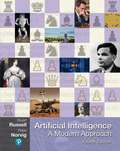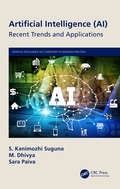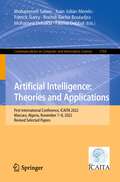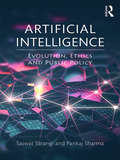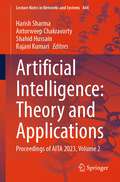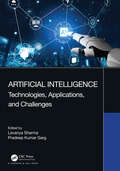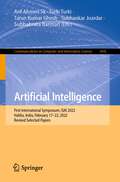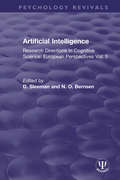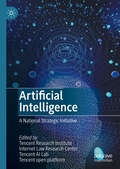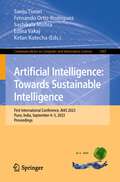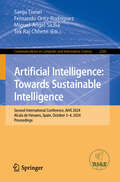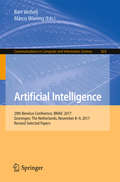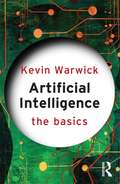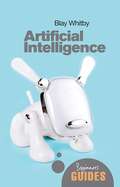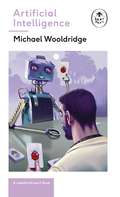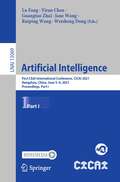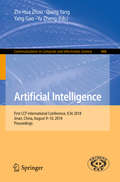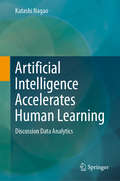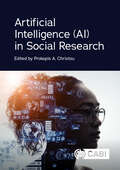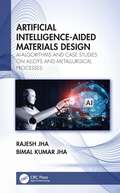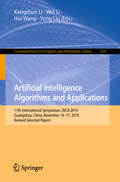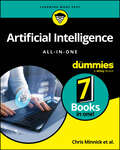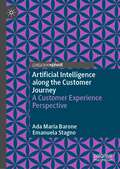- Table View
- List View
Artificial Intelligence: A Modern Approach
by Stuart Russell Peter NorvigArtificial Intelligence: A Modern Approach (AIMA) is a university textbook on artificial intelligence, written by Stuart J. Russell and Peter Norvig. It was first published in 1995 and the fourth edition of the book was released 28 April 2020. It is used in over 1400 universities worldwide and has been called "the most popular artificial intelligence textbook in the world". It is considered the standard text in the field of artificial intelligence. The book is intended for an undergraduate audience but can also be used for graduate-level studies with the suggestion of adding some of the primary sources listed in the extensive bibliography.
Artificial Intelligence: Recent Trends and Applications (Artificial Intelligence (AI): Elementary to Advanced Practices)
by S. Kanimozhi Suguna, M. Dhivya, and Sara PaivaThis book aims to bring together leading academic scientists, researchers, and research scholars to exchange and share their experiences and research results on all aspects of Artificial Intelligence. The book provides a premier interdisciplinary platform to present practical challenges and adopted solutions. The book addresses the complete functional framework workflow in Artificial Intelligence technology. It explores the basic and high-level concepts and can serve as a manual for the industry for beginners and the more advanced. It covers intelligent and automated systems and its implications to the real-world, and offers data acquisition and case studies related to data-intensive technologies in AI-based applications. The book will be of interest to researchers, professionals, scientists, professors, students of computer science engineering, electronics and communications, as well as information technology.
Artificial Intelligence: First International Conference, ICAITA 2022, Mascara, Algeria, November 7–8, 2022, Revised Selected Papers (Communications in Computer and Information Science #1769)
by Mohammed Salem Juan Julián Merelo Patrick Siarry Rochdi Bachir Bouiadjra Mohamed Debakla Fatima DebbatThis volume constitutes selected papers presented at the First International Conference on Artificial Intelligence: Theories and Applications, ICAITA 2022, held in Mascara, Algeria, in November 2022. The 23 papers were thoroughly reviewed and selected from the 66 qualified submissions. They are organized in topical sections on artificial vision; and articial intelligence in big data and natural language processing.
Artificial Intelligence: Evolution, Ethics and Public Policy
by Saswat Sarangi Pankaj SharmaWhat will the future be? A dystopian landscape controlled by machines or a brave new world full of possibilities? Perhaps the answer lies with Artificial Intelligence (AI)—a phenomenon much beyond technology that has, continues to, and will shape lives in ways we do not understand yet. This book traces the evolution of AI in contemporary history. It analyses how AI is primarily being driven by "capital" as the only "factor of production" and its consequences for the global political economy. It further explores the dystopian prospect of mass unemployment by AI and takes up the ethical aspects of AI and its possible use in undermining natural and fundamental rights. A tract for the times, this volume will be a major intervention in an area that is heavily debated but rarely understood. It will be essential reading for researchers and students of digital humanities, politics, economics, science and technology studies, physics, and computer science. It will also be key reading for policy makers, cyber experts and bureaucrats.
Artificial Intelligence: Proceedings of AITA 2023, Volume 2 (Lecture Notes in Networks and Systems #844)
by Harish Sharma Antorweep Chakravorty Shahid Hussain Rajani KumariThis book features a collection of high-quality research papers presented at International Conference on Artificial Intelligence: Theory and Applications (AITA 2023), held during 11–12 August 2023 in Bengaluru, India. The book is divided into two volumes and presents original research and review papers related to artificial intelligence and its applications in various domains including health care, finance, transportation, education, and many more.
Artificial Intelligence: Technologies, Applications, and Challenges
by Lavanya Sharma Pradeep Kumar GargArtificial Intelligence: Technologies, Applications, and Challenges is an invaluable resource for readers to explore the utilization of Artificial Intelligence, applications, challenges, and its underlying technologies in different applications areas. Using a series of present and future applications, such as indoor-outdoor securities, graphic signal processing, robotic surgery, image processing, character recognition, augmented reality, object detection and tracking, intelligent traffic monitoring, emergency department medical imaging, and many more, this publication will support readers to get deeper knowledge and implementing the tools of Artificial Intelligence. The book offers comprehensive coverage of the most essential topics, including: Rise of the machines and communications to IoT (3G, 5G). Tools and Technologies of Artificial Intelligence Real-time applications of artificial intelligence using machine learning and deep learning. Challenging Issues and Novel Solutions for realistic applications Mining and tracking of motion based object data image processing and analysis into the unified framework to understand both IoT and Artificial Intelligence-based applications. This book will be an ideal resource for IT professionals, researchers, under or post-graduate students, practitioners, and technology developers who are interested in gaining insight to the Artificial Intelligence with deep learning, IoT and machine learning, critical applications domains, technologies, and solutions to handle relevant challenges.
Artificial Intelligence: First International Symposium, ISAI 2022, Haldia, India, February 17-22, 2022, Revised Selected Papers (Communications in Computer and Information Science #1695)
by Arif Ahmed Sk Turki Turki Tarun Kumar Ghosh Subhankar Joardar Subhabrata BarmanThis book constitutes the refereed proceedings of the First International Symposium on Artificial Intelligence, ISAI 2022, held in Haldia, India, during February 17-22, 2022. The 30 full papers included in this book were carefully reviewed and selected from 75 submissions. They were organized in topical sections as follows: information systems, mathematics and data analyses; and applied artificial intelligence..
Artificial Intelligence: Research Directions in Cognitive Science: European Perspectives Vol. 5 (Psychology Revivals)
by D. Sleeman N. O. BernsenOriginally published in 1992, this title reviews seven major subareas in artificial intelligence at that time: knowledge acquisition; logic programming and representation; machine learning; natural language; vision; the design of an AI programming environment; and medicine, a major application area of AI. This volume was an attempt primarily to inform fellow AI workers of recent European work in AI. It was hoped that researchers in ‘sister’ disciplines, such as computer science and linguistics would gain a deeper understanding of the assumptions, techniques and tools of contemporary AI.
Artificial Intelligence: A National Strategic Initiative
by Tencent Research Institute Caict Tencent Ai Lab Tencent Open PlatformThis book begins with the past and present of the subversive technology of artificial intelligence, clearly analyzes the overall picture, latest developments and development trends of the artificial intelligence industry, and conducts in-depth research on the competitive situation of various countries. The book also provides an in-depth analysis of the opportunities and challenges that artificial intelligence brings to individuals, businesses, and society. For readers who want to fully understand artificial intelligence, this book provides an important reference and is a must-read.
Artificial Intelligence: First International Conference, AI4S 2023, Pune, India, September 4-5, 2023, Proceedings (Communications in Computer and Information Science #1907)
by Sanju Tiwari Fernando Ortiz-Rodríguez Sashikala Mishra Edlira Vakaj Ketan KotechaThis book constitutes the proceedings of the First International Conference, AI4S 2023, held in Pune, India, during September 4-5, 2023.The 14 full papers and the 2 short papers included in this volume were carefully reviewed and selected from 72 submissions. This volume aims to open discussion on trustworthy AI and related topics, trying to bring the most up to date developments around the world from researchers and practitioners.
Artificial Intelligence: Second International Conference, AI4S 2024, Alcala de Henares, Spain, October 3–4, 2024, Proceedings (Communications in Computer and Information Science #2243)
by Sanju Tiwari Fernando Ortiz-Rodriguez Miguel-Angel Sicilia Tek Raj ChhetriThis book constitutes the proceedings of the Second International Conference on Artificial Intelligence: Towards Sustainable Intelligence, AI4S 2024, held in Alcala de Henares, Spain, during October 3-4, 2024. The 16 full papers and 2 short papers included in this book were carefully reviewed and selected from 59 submissions. They deal with trustworthy AI and related topics, focusing on software and its engineering; software development process management and methods, etc.
Artificial Intelligence: 29th Benelux Conference, BNAIC 2017, Groningen, The Netherlands, November 8-9, 2017, Revised Selected Papers (Communications In Computer And Information Science #823)
by Bart Verheij Marco WieringThis book contains a selection of the best papers of the 29th Benelux Conference on Artificial Intelligence, BNAIC 2017, held in Groningen, The Netherlands, in November 2017. <p><p> The 11 full papers presented in this volume were carefully reviewed and selected from 30 submissions. They address various aspects of artificial intelligence such as natural language processing, agent technology, game theory, problem solving, machine learning, human-agent interaction, AI and education, and data analysis.
Artificial Intelligence: The Basics (The Basics)
by Kevin Warwick'if AI is outside your field, or you know something of the subject and would like to know more then Artificial Intelligence: The Basics is a brilliant primer.' - Nick Smith, Engineering and Technology Magazine November 2011 Artificial Intelligence: The Basics is a concise and cutting-edge introduction to the fast moving world of AI. The author Kevin Warwick, a pioneer in the field, examines issues of what it means to be man or machine and looks at advances in robotics which have blurred the boundaries. Topics covered include: how intelligence can be defined whether machines can 'think' sensory input in machine systems the nature of consciousness the controversial culturing of human neurons. Exploring issues at the heart of the subject, this book is suitable for anyone interested in AI, and provides an illuminating and accessible introduction to this fascinating subject.
Artificial Intelligence: A Beginner's Guide (Beginner's Guides)
by Blay WhitbyTomorrow begins right here as we embark on an enthralling and jargon-free journey into the world of computers and the inner recesses of the human mind. Readers encounter everything from the nanotechnology used to make insect-like robots, to computers that perform surgery, in addition to discovering the biggest controversies to dog the field of AI. Blay Whitby is a Lecturer on Cognitive Science and Artificial Intelligence at the University of Sussex UK. He is the author of two books and numerous papers.
Artificial Intelligence: Everything you need to know about the coming AI. A Ladybird Expert Book (The Ladybird Expert Series #27)
by Michael Wooldridge'I propose to consider the question, 'Can machines think?' Alan Turing (1950)Part of the ALL-NEW Ladybird Expert series.This book is for everyone living in the age of Artificial Intelligence. And this is an accessible and authoritative introduction to one of the most important conversations of our time . . . Written by computer scientist Michael Wooldridge, Artificial Intelligence chronicles the development of intelligent machines, from Turing's dream of machines that think, to today's digital assistants like Siri and Alexa. AI is not something that awaits us in the future. Inside you'll learn how we have come to rely on embedded AI software and what a world of ubiquitous AI might look like.What's inside?- The British mathematician Alan Turing- Can machines 'understand'?- Logical and Behavioural AI- The reality of AI today- AI tomorrow- And much more . . . For an adult readership, the Ladybird Expert series is produced in the same iconic small hardback format pioneered by the original Ladybirds. Each beautifully illustrated book features the first new illustrations produced in the original Ladybird style for nearly forty years.
Artificial Intelligence: First CAAI International Conference, CICAI 2021, Hangzhou, China, June 5–6, 2021, Proceedings, Part I (Lecture Notes in Computer Science #13069)
by Guangtao Zhai Jane Wang Yiran Chen Lu Fang Ruiping Wang Weisheng DongThis two-volume set LNCS 13069-13070 constitutes selected papers presented at the First CAAI International Conference on Artificial Intelligence, held in Hangzhou, China, in June 2021. Due to the COVID-19 pandemic the conference was partially held online. The 105 papers were thoroughly reviewed and selected from 307 qualified submissions. The papers are organized in topical sections on applications of AI; computer vision; data mining; explainability, understandability, and verifiability of AI; machine learning; natural language processing; robotics; and other AI related topics.
Artificial Intelligence: First CCF International Conference, ICAI 2018, Jinan, China, August 9-10, 2018, Proceedings (Communications in Computer and Information Science #888)
by Zhi-Hua Zhou Qiang Yang Yang Gao Yu ZhengThis book constitutes the refereed proceedings of the First CCF International Conference on Artificial Intelligence, CCF-ICAI 2018, held in Jinan, China in August, 2018. The 17 papers presented were carefully reviewed and selected from 82 submissions. The papers are organized in topical sections on unsupervised learning, graph-based and semi-supervised learning, neural networks and deep learning, planning and optimization, AI applications.
Artificial Intelligence (2nd edition)
by Patrick H. WinstonThis is an eagerly awaited revision of the single bestselling introduction to Artificial Intelligence ever published. It retains the best features of the earlier works including superior readability, currency, and excellence in the selection of the examples.
Artificial Intelligence Accelerates Human Learning: Discussion Data Analytics
by Katashi NagaoFocusing on students’ presentations and discussions in laboratory seminars, this book presents case studies on evidence-based education using artificial intelligence (AI) technologies. It proposes a system to help users complete research activities, and a machine-learning method that makes the system suitable for long-term operation by performing data mining for discussions and automatically extracting essential tasks. By illustrating the complete process – proposal, implementation, and operation – of applying machine learning techniques to real-world situations, the book will inspire researchers and professionals to develop innovative new applications for education. The book is divided into six chapters, the first of which provides an overview of AI research and practice in education. In turn, Chapter 2 describes a mechanism for applying data analytics to student discussions and utilizing the results for knowledge creation activities such as research. Based on discussion data analytics, Chapter 3 describes a creative activity support system that effectively utilizes the analytical results of the discussion for subsequent activities. Chapter 4 discusses the incorporation of a gamification method to evaluate and improve discussion skills while maintaining the motivation to participate in the discussion. Chapters 5 and 6 describe an advanced learning environment for honing students’ discussion and presentation skills. Two important systems proposed here are a presentation training system using virtual reality technologies, and an interactive presentation/discussion training system using a humanoid robot. In the former, the virtual space is constructed by measuring the three-dimensional shape of the actual auditorium, presentations are performed in the same way as in the real world, and the AI as audience automatically evaluates the presentation and provides feedback. In the latter, a humanoid robot makes some remarks on and asks questions about students’ presentations, and the students practice responding to it.
Artificial Intelligence (AI) in Social Research
The field of social research is characterized by its broad scope and interdisciplinary nature, encompassing the examination of human behaviour, societies, and various facets of social existence; however, it is influenced by numerous factors, including technological advancements. It is therefore no surprise that Artificial Intelligence (AI) has rapidly become a driving force, bringing about substantial transformations within the field. The use of AI-assisted tools and programmes for the collection, analysis, and interpretation of both quantitative and qualitative data is increasing at a remarkable pace. The implications of utilizing these applications are significant and noteworthy. While these technologies present numerous opportunities, it is important to acknowledge the accompanying dilemmas and risks associated with this form of technological advancement. With a focus on AI's research implications, this book explores various considerations and examples across different disciplines of social research. It highlights the considerable promise AI holds for revolutionizing the discipline while also guiding readers in contemplating the potential drawbacks and various concerns. By doing so, researchers can optimize the capabilities of AI and promote its responsible, reliable, and beneficial application in enhancing and advancing social research.
Artificial Intelligence-Aided Materials Design: AI-Algorithms and Case Studies on Alloys and Metallurgical Processes
by Rajesh Jha Bimal Kumar JhaThis book describes the application of artificial intelligence (AI)/machine learning (ML) concepts to develop predictive models that can be used to design alloy materials, including hard and soft magnetic alloys, nickel-base superalloys, titanium-base alloys, and aluminum-base alloys. Readers new to AI/ML algorithms can use this book as a starting point and use the MATLAB® and Python implementation of AI/ML algorithms through included case studies. Experienced AI/ML researchers who want to try new algorithms can use this book and study the case studies for reference. Offers advantages and limitations of several AI concepts and their proper implementation in various data types generated through experiments and computer simulations and from industries in different file formats Helps readers to develop predictive models through AI/ML algorithms by writing their own computer code or using resources where they do not have to write code Covers downloadable resources such as MATLAB GUI/APP and Python implementation that can be used on common mobile devices Discusses the CALPHAD approach and ways to use data generated from it Features a chapter on metallurgical/materials concepts to help readers understand the case studies and thus proper implementation of AI/ML algorithms under the framework of data-driven materials science Uses case studies to examine the importance of using unsupervised machine learning algorithms in determining patterns in datasets This book is written for materials scientists and metallurgists interested in the application of AI, ML, and data science in the development of new materials.
Artificial Intelligence Algorithm Design for Systems: Proceedings of 13th Computer Science Online Conference 2024, Volume 3 (Lecture Notes in Networks and Systems #1120)
by Radek Silhavy Petr SilhavyThis volume delves into the application of Artificial Intelligence within systems and network environments. Highlighted papers investigate the latest in neural network applications, optimisation strategies, and hybrid bio-inspired algorithms. It includes the rigorously reviewed proceedings of the Artificial Intelligence Application in Networks and Systems session of the 13th Computer Science Online Conference 2024 (CSOC 2024), held online in April 2024.
Artificial Intelligence Algorithms and Applications: 11th International Symposium, ISICA 2019, Guangzhou, China, November 16–17, 2019, Revised Selected Papers (Communications in Computer and Information Science #1205)
by Kangshun Li Wei Li Hui Wang Yong LiuThis book constitutes the thoroughly refereed proceedings of the 11th International Symposium on Intelligence Computation and Applications, ISICA 2019, held in Guangzhou, China, in November 2019.The 65 papers presented were carefully reviewed and selected from the total of 112 submissions. This volume features the most up-to-date research in evolutionary algorithms, parallel computing and quantum computing, evolutionary multi-objective and dynamic optimization, intelligent multimedia systems, virtualization and AI applications, smart scheduling, intelligent control, big data and cloud computing, deep learning, and hybrid machine learning systems.The papers are organized according to the following topical sections: new frontier in evolutionary algorithms; evolutionary multi-objective and dynamic optimization; intelligent multimedia systems; virtualization and AI applications; smart scheduling; intelligent control; big data and cloud computing; statistical learning.
Artificial Intelligence All-in-One For Dummies
by John Paul Mueller Sheryl Lindsell-Roberts Paul Mladjenovic Stephanie Diamond Shiv Singh Chris Minnick Luca Massaron Daniel Stanton Pam Baker Jeffrey AllanA comprehensive roadmap to using AI in your career and in your life Artificial intelligence is everywhere. Major software organizations like Microsoft, Google, and Apple have built AI directly into products and invited the world to become part of the AI revolution. And it's impossible to use these tools to their fullest potential without understanding the basics of what AI is and what it can do. Artificial Intelligence All-in-One For Dummies compiles insight from the expert authors of AI books in the For Dummies series to provide an easy-to-follow walkthrough for anyone interested in learning how to use AI. You'll learn how to put artificial intelligence to work for you and your company in a wide variety of situations, from creating office assistants to managing projects and marketing your products. Inside the book: How to prompt AI platforms like ChatGPT and Copilot while avoiding “hallucinations” and other bugs Strategies for adding artificial intelligence tools to your company's existing workflows to improve efficiency and generate new opportunities Techniques to improve your programming capabilities with AI or create new AI-powered tools Perfect for professionals curious about the potential and pitfalls associated with generative artificial intelligence, Artificial Intelligence All-in-One For Dummies shows you exactly how AI works and how you can apply it in your own professional and personal life.
Artificial Intelligence along the Customer Journey: A Customer Experience Perspective
by Ada Maria Barone Emanuela StagnoThe development of several AI solutions has revolutionized the way in which consumers behave. Serving as a guide to the role that AI plays on different aspects of consumers’ life, this book provides a comprehensive understanding of the main artificial intelligence (AI) solutions available in the market. In particular, the authors adopt a customer experience approach to investigate how different AI technologies play a role at different stages of the customer journey (e.g., from pre-purchase to post-purchase decisions). Covering a range of technologies, such as augmented reality, voice assistants, chatbots and robots, readers will be able to learn which strategies and AI solutions are more effective at different stages of the customer journey.
